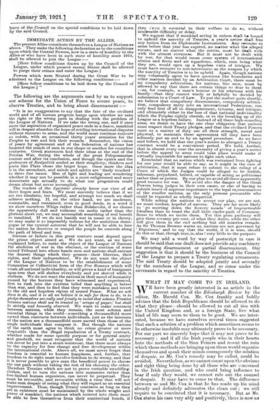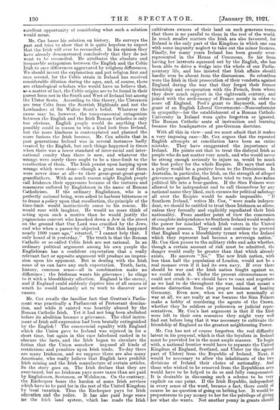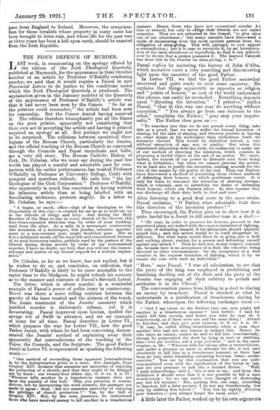WHAT IT MAY COME TO IN IRELAND.
WE have been greatly interested in an article in the current number of the Edinburgh Review by the editor, Mr. Harold Cox. Mr. Cox frankly and boldly advises that the Irish Republicans should be allowed to do what they please—should be allowed to cut all ties with the United Kingdom and, as a foreign State, live what kind of life may seem to them to be good. We are inter- ested, because we have ourselves several times suggested that such a solution of a problem which sometimes seems to be otherwise insoluble may ultimately prove to be necessary. For our part we sincerely hope that it may not prove to be necessary ; and if all the Irish people who in their hearts hate the methods of the Sinn Feiners and resent the ruin which those methods are bringing upon them would organize themselves and speak their minds courageously the solution of despair, as Mr. Cox's remedy may be called, could be avoided. Nevertheless, as we cannot count upon the obvious and right thing being done by all those who are concerned in the Irish question, and who could bring influence to bear if only they would, we cannot rule out the counsel of despair. It may have to come to that. The difference between us and Mr. Cox is that he has made up his mind already and definitely advocates the clean cut ; we still require to be convinced that it is necessary. But as Mr. Cox states his case very ably and positively, there is now an excellent opportunity of considering what such a solution would mean.
Mr. Cox bases his solution on history. He surveys the past and tries to show that it is quite hopeless to expect that the Irish will ever be reconciled. In his opinion they have already demonstrated conclusively that they do not want to be reconciled. He attributes the absolute and irreparable antagonism between the Englisb. and the Celtic Irish to race differences aggravated by religious differences. We should invert the explanation and put religion first and race second, for the Celtic strain in Ireland has received considerable dilution during the ages, and, of course, there are ethnological scholars who would have us believe that, as a matter of fact, the Celtic origins are to be found in their purest form not in the South and West of Ireland but among the Ulster Scots. According to this theory, the Ulstermen are true Celts from the Scottish Highlands and not the Lowlanders of Sir Walter Scott's belief. 'Whatever the cause may be, however, the temperamental antagonism between the English and the Irish Roman Catholics is only too obvious. English people would do anything they possibly could in reason to win a kind look from Ireland, but the more kindness is contemplated and planned the more furious the Irish become. Mr. Cox admits that in past generations Ireland was in several instances badly treated by the English, but such things happened in times when there was a lower standard of inter-racial and inter- national comity than there is now, and whatever the wrongs were surely there ought to be a time-limit to the recollection of them. The Irish persist upon harping upon wrongs which were done—though a great many of them were never done at all—to their great-great-great-great- grandfathers. With as much reason might English people call Irishmen their oppressors because of the tortures and massacres suffered by Englishmen in the name of Roman Catholicism. If the ordinary Englishman, who is a perfectly rational being, were asked to harbour bitterness or to frame a policy upon that recollection, the principle of the time-limit would instinctively come to his rescue. He would roar with laughter. He would no more think of acting upon such a motive than he would justify the pugnacious convert who knocked down a Jew in the street on the ground that Our Lord was crucified by the Jews, and who when a passer-by objected, " But that happened nearly 1900 years ago," retorted, " I cannot help that. I only heard of it yesterday." The truth is that the Roman Catholic or so-called Celtic Irish are not rational. In an ordinary political argument among his own people the Englishman has a confident expectation that a really relevant fact or apposite argument will produce an impres- sion upon his opponent. But in dealing with the Irish none of us can have any such expectation. Truth, facts, history, common sense—all in combination make no difference ; the Irishman wants his grievance ; he clings to it with a bloodthirsty affection. England is the enemy, and if England could suddenly deprive him of all causes of wrath he would instantly set to work to discover new causes.
Mr. Cox recalls the familiar fact that Grattan's Parlia- ment was practically a Parliament of Protestant domina- tion, and while it existed was heartily abused by the Roman Catholic Irish. Yet it had not long been abolished before its abolition became a grievance. The chief instru- ment of Irish self-expression had been brutally extinguished by the English ! The commercial equality with England which the Union gave to Ireland was rejoiced in for a short time, but again in this case falsehood rushed in to obscure the facts, and the Irish began to circulate the fiction that the Union somehow imposed all kinds of restrictions and penalties upon Irish trade. To-day there are many Irishmen, and we suppose there are also many Americans, who really believe that English laws prohibit Irish mining and the Irish manufacture of certain articles. So the story goes on. The Irish declare that they are over-taxed, but no Irishman pays more taxes than are paid by Englishmen, Scotsmen, or Welshmen. On the contrary, the Exchequer bears the burden of some Irish services which have to be paid for in the rest of the United Kingdom by local taxation. Thus the Exchequer pays for Irish education and the police. It has also paid huge sums for the Irish land. system, which has made the Irish cultivators owners of their land on such generous terms that there is no parallel to them in the rest of the world. In much smaller matters the Irish are also favoured, for Ireland is the only part of the Kingdom in which one can with some impunity neglect to take out the minor licences. Finally, for many years Ireland has been grossly over- represented in the House of Commons. So far from having her interests squeezed out by the English, she has been able to drive a wedge into the whole of our Parlia- mentary life, and has insisted that Irish affairs should hardly ever be absent from the discussions. So relentless -were the Irish in their prosecution of their vendetta against England during the war that they forgot their former friendship and co-operation with the French, from whom they drew much support in the eighteenth century, and joined with the arch-enemy of France merely in order to score off England. Peel's grant to Maynooth, and the grant of an English Liberal Government—Nonconformist in sympathy—for the establishment of a Roman Catholic University in Ireland were quite forgotten or ignored. The Roman Catholic- seats of instruction and learning became the headquarters of pro-German doctrine.
With all this in view—and we must admit that it makes a very imposing case—Mr. Cox argues that the repeated English attempts at conciliation have been an entire mistake. They have exaggerated the importance of Ireland. He points out that to treat the disloyal Irish as people who do not matter very much, and who would never be strong enough seriously to injure us, would be much the best policy for the whole Empire. He says that such a policy would be a positive boon to the Dominions. In Australia, in particular, the Irish, on the strength of alleged grievances against England, have tried to turn Australian political life into a bear-garden. If the Sinn Feiners were allowed to be independent and to call themselves by any national name they liked, such excuses for political sabotage all over the Empire would be made impossible. " If Southern Ireland," writes Mr. Cox, " were made indepen- dent, we should be entitled to treat these Irishmen as aliens, unless they formally and explicitly repudiated their Irish nationality. From another point of view the concession of complete independence to Southern Irelandwould weaken the power for mischief which Irish voters in the United States now possess. They could not continue to pretend that England was a bloodthirsty tyrant when the Ireland which they represent had become a sovereign nation." Mr. Cox then passes to the military risks and asks whether, though a certain amount of risk must be admitted, the danger would really be greater than that which already exists. He answers "No." The new Irish nation, with less than half the population of London, would not be a real menace even if it had its own navy. If ever there should be war and the Irish nation fought against us, we could crush it. Under the present circumstances we could not crush it—we should have to coax and negotiate as we had to do throughout the war, and that meant a serious distraction from the proper business of beating Germany. Even now, when we are not nominally at war at all, we are really at war because the Sinn Feiners make a hobby of murdering the agents of the Crown, whether they be soldiers or policemen or judicial repre- sentatives. Mr. Cox's last argument is that if the Irish were left to their own resources they might very well find out before long that it was necessary to cultivate the friendship of England as the greatest neighbouring Power.
Mr. Cox has not of course forgotten the real difficulty latent in his proposal, which is that the loyalists in Ireland must be provided for in the most ample manner. To begin with, a national frontier would have to separate the United Kingdom of England, Scotland, and Ulster (or the agreed part of Ulster) from the Republic of Ireland. Next, it would be necessary to allow the inhabitants of the two divisions of Ireland their choice of nationality. And those who wished to be removed from the Republican area would have to be helped to do so and fully compensated. It is desirable in discussing such a scheme to be very explicit on one point. If the Irish Republic, independent in every sense of the word, became a fact, there could of course be no question of going on bribing her. It would be preposterous to pay money to her for the privilege of giving her what she wants. Not another penny in grants should pass from England to Ireland. Moreover, the compensa- tion for those loyalists whose property in many cases has been brought to utter ruin, and whose life for the past two or three years has been a hell upon earth, should be exacted from the Irish Republic.




































 Previous page
Previous page